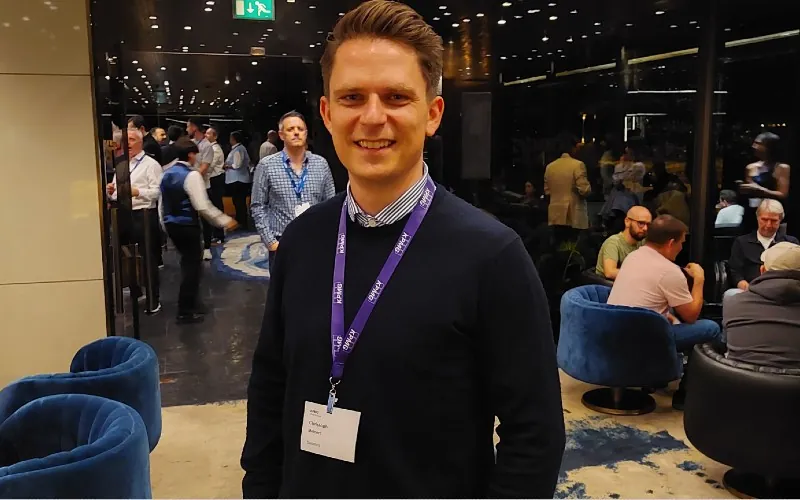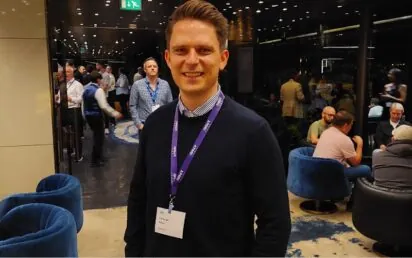Sometimes you meet a founder who could change the world – and I did just that on Monday evening.
Dr Christoph Meinert was at a KPMG networking event in Lisbon, part of the Web Summit tech conference’s ‘Night Summit’ series of informal evening meetups.
Dr Meinert, a German who has lived in Australia for the last 13 years, will represent the latter with his startup Gelomics at KPMG’s Global Tech Innovator grand final in Portugal on Wednesday.
A scientist by training who completed his PhD studies in 2018, he realised that some of the biotechnology he had developed had commercial potential.
“Gelomics came from experiencing the pain points that we were trying to address ourselves: as academic scientists, we worked in the fields of developing new therapeutics and new medical devices for treating different diseases and also ailments of the body,” the CEO tells BusinessCloud ahead of the final.
“We realised that we could potentially influence the way that drug development is performed.”
Traditionally, new therapeutics are tested on cells that are isolated from a tissue and placed in a stiff plastic surface – a petri dish. “It’s a very unnatural environment for cells to grow in,” explains Dr Meinert. “The data you generate is not predictive and it does not resemble human biology very well.
“You have the same issue with animals: a lot of animals are used for research purposes, close to 200 million every single year. But actually, the biology of animals and humans is very, very different.”
He estimates that in drug discovery, to take one example, 95% of drug candidates that are successful in both cell and animal testing are not successful in humans.
The technology he worked on during his PhD and with his co-founders essentially allowed them to grow small representations of human tissue in that petri dish.
“Initially we thought we’d do this for clinical purposes – to restore damaged tissues in patients – but then we realised we could use this in vitro in the lab to improve the predictiveness and the efficiency of the drug discovery process.”
“That essentially led to us realising the commercial potential and spinning out our company.”
A long road to Lisbon
Building a MedTech company can be an arduous process. In Gelomics’s case, the tech is based on a decade of R&D and it raised millions in investment before it even kicked into gear.
“There’s a lot of trial and error involved: not everything worked out,” he says of the natural process. “But then at a certain point we had our first provisional patent; we published some of the data sets; and the citations in publications then went up very quickly.
“We began receiving many requests to use our technology in different applications and academic research… that’s when we realised that, yes, this had true commercial potential.”
Gelomics is a pre-seed company which raised $3.2 million in December and has since ramped up the team from two to 20 people. Its products are now used in 23 global markets, with around 250 academic laboratories among the early adopters. Most importantly of all, it has two partnerships with larger pharmaceutical companies and contract research organisations.
Cancer killer
One is using it to help develop a drug that activates the human immune system to kill a patient’s own cancer.
“You would typically take a mouse, inject it with cancer cells, a tumour would develop and then you would add your drug and human T cells to the mouse [to test the treatment]. Everything would happen inside of the mouse… this is a very difficult process.
“It takes a lot of money; very specialised expertise; and a long time – typically three months. And half of the data set is not even usable because the variability is so high.
“We were able to essentially recreate this process using a simple lab-based process [based around grown human tissue] which only takes a week or two.
“Using synthetic tissue reduces the requirements for animal testing and ultimately gives you also more predictive data sets, because they’re using human biology, not animal biology.”
Global Tech Innovator
Gelomics is one of 23 businesses to reach the KPMG Global Tech Innovator final from 1,500 applications.
Dr Meinert says representing Australia in the competition – part of Web Summit, attended by more than 71,000 people this year – is a big honour and also a lot of pressure.
“But we’re not shy of challenging ourselves in this way,” he adds. “I was always a very energetic guy and wanted to make an impact beyond medical publications… so we decided to start a business – and here we are today.”
Our ‘From the Summit’ daily dispatch email will be sent out at the end of each day of the Web Summit tech conference in Lisbon. Subscribe to our newsletter to receive it in your inbox.


